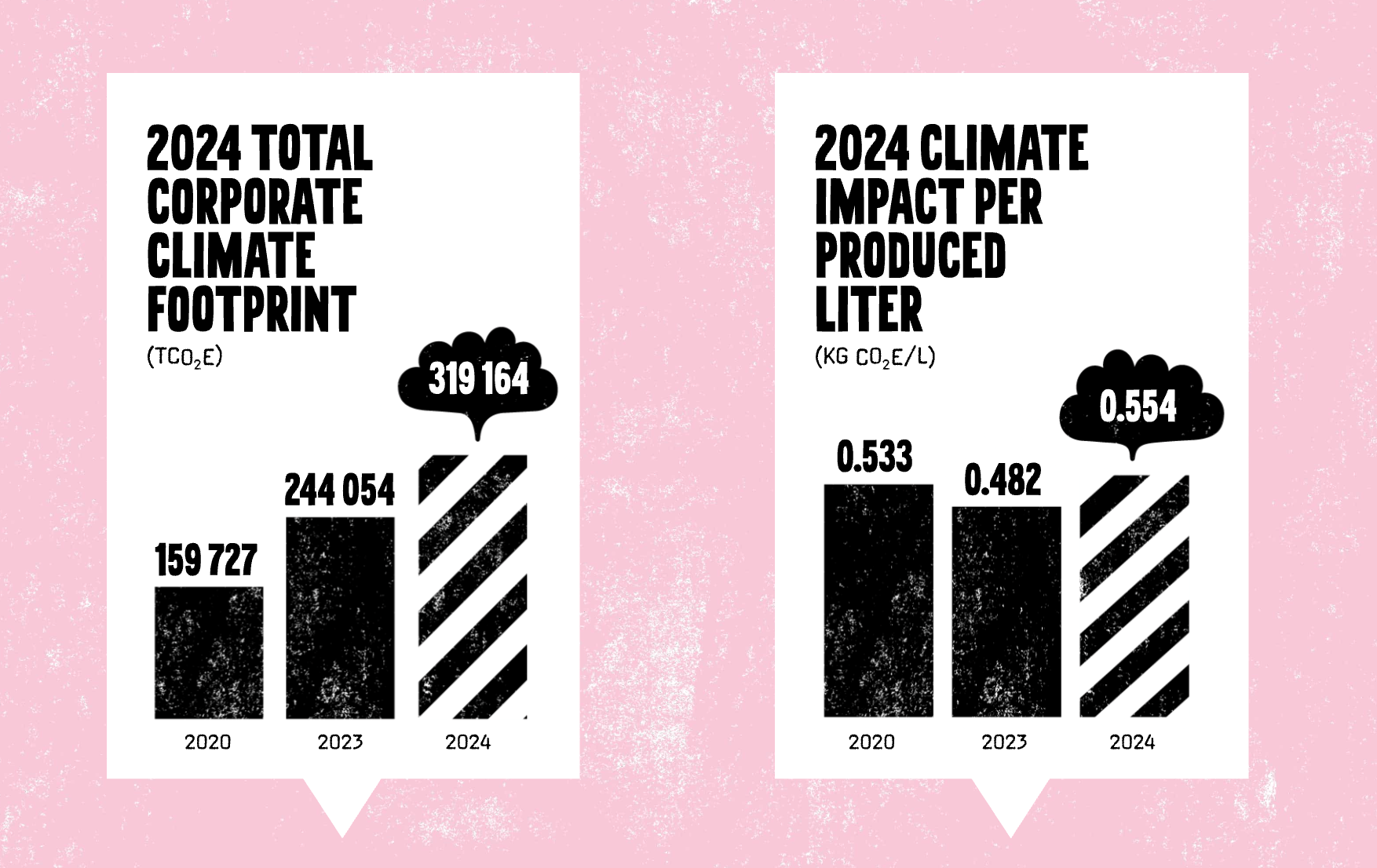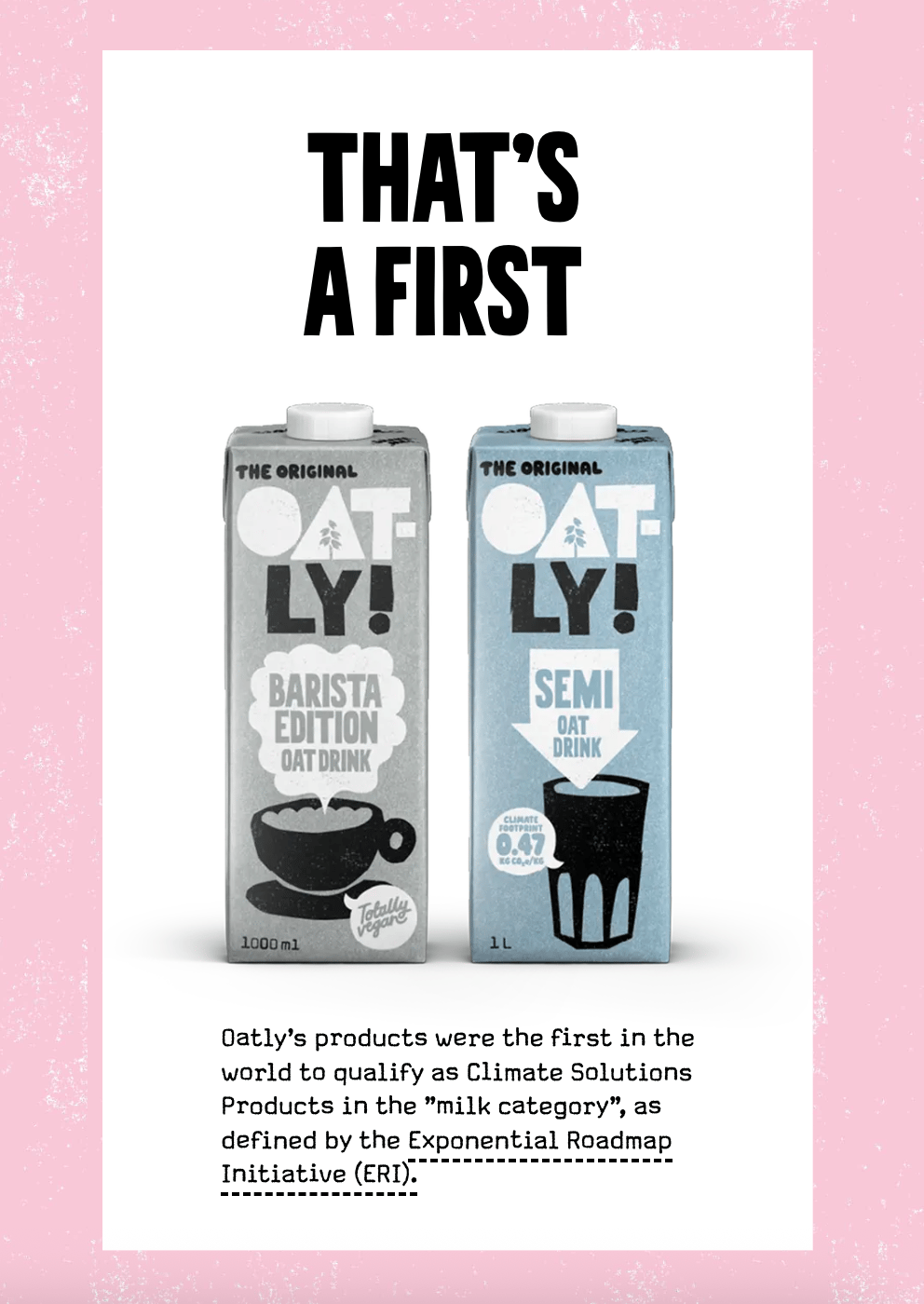- Green Digest
- Posts
- Interview Series: Erin Augustine
Interview Series: Erin Augustine
Inside Oatly’s sustainability strategy: A conversation with VP of Global Sustainability Erin Augustine

This week’s read time: 5 minutes
Welcome to the Green Digest Interview Series, our bi-weekly feature showcasing conversations with the industry’s leading voices - CSOs, sustainability directors, and other senior professionals shaping the sustainability landscape. Each edition dives into their professional journeys, hands-on insights, and outlook on the challenges and opportunities defining corporate sustainability.
These interviews are designed to be quick, insightful reads, offering you actionable takeaways and a personal glimpse into the people leading the way. Stay tuned for stories, strategies, and lessons that matter to you.
PRESENTED BY ECONOMIST IMPACT
Economist Impact’s 10th anniversary Sustainability Week | March 10th – 12th 2025, London
Economist Impact’s 10th anniversary Sustainability Week will empower businesses to go beyond “reduce and reuse” and to accelerate their sustainability strategies. With more than 400 speakers and over 2,500 in-person attendees, the event will present original insights and practical solutions focusing across all industries, driving action on sustainability. Meet the most influential speakers and experts who will deliver discussions on achieving net-zero by 2050, with sessions for challenging sectors, technology, agriculture, supply chains and more.
Register here and use discount code GD-SW/MP20 to get 20% off on your ticket
PROFILE
This week’s guest:
Erin Augustine
VP of Global Sustainability at Oatly

Erin Augustine is the Vice President of Global Sustainability at Oatly, the world’s largest and original oat drink company.
Erin is focused on ensuring sustainability is at the beating heart of everything they do at Oatly, from strategic business decisions to enabling and empowering the teams to deliver on the company’s ambitious goals as detailed in Oatly’s Sustainability plan.
Prior to working for Oatly, Erin led responsible sourcing at Wolverine Worldwide and sustainability for Kellogg Company global operations. She has also worked in environmental education, non-profit, and consulting roles.

Oatly has long positioned itself as a sustainability leader in the food & drinks sector. Can you walk us through your current sustainability strategy and the core pillars that guide your efforts today?
With sustainability at the core of our mission, our priority is to remain at the forefront of climate science and action. We exist to make it easier for people to eat better and live healthier lives without recklessly taxing the planet’s resources. Our Global Sustainability Plan – which we updated earlier this year - expands our commitments beyond climate to include nature, people, and nutrition now as well.
Oatly is proud to be the first food and beverage company certified as a “Climate Solutions Company” by the Exponential Roadmap Initiative, recognizing our positive impact in shifting consumers away from dairy and thereby reducing climate impact in Society. Our climate targets are not only reviewed in partnership with EcoAct (part of Schneider Electric) but also aligned with the Climate Solutions Framework and the global Carbon Law Concept.
Additionally, in partnership with Futerra and Oxford Net Zero, we’re pioneering new ways to set, measure, and report on targets toward societal net zero.
In 2024 though, your corporate climate footprint (reported as kg CO₂e/L) increased approximately 15% from 2023. What were the main drivers behind this rise, and how are you addressing them moving forward?
Just like everyone else, we are having to weather the economic and climate shocks that are impacting progress toward our goals. As outlined in our 2024 reporting, we have strategies in place for each of the most prominent sources of GHG emissions. Examples include:
To combat the increased GHG emissions from oats in 2024, we’re partnering with our suppliers to decrease the amount of oats sourced from Finland (Finnish oats result in higher emissions than oats sourced from other countries, such as Sweden).
We’re expanding our work with oat producers and our oat mill partners to support the regenerative agriculture transition and developing supply-shed-level emission factors so we have more accurate calculations.
Our GHG emissions from energy were reduced by 3% in 2024 vs 2023. And to further accelerate this progress, we are improving our thermal energy efficiencies and continuing to source renewable electricity and reduce electricity use too.
GHG emissions from transportation decreased by 4% in 2024 vs 2023. Now we are especially focused on reducing the distances travelled and implementing the lowest possible impact transport across all lanes.

From Oatly’s latest sustainability report
On the positive side, avoided emissions per liter increased from 0.44 kg CO₂e in 2019 to 0.53 kg in 2024. Can you walk us through the main drivers behind this shift and how you made it happen?
Our avoided emissions are dependent on three levers: conversion, climate footprint, and sales. Due to the footprint of our products versus comparable cow’s milk and increased conversion from cow’s milk in some markets, we are proud that our avoided emissions per liter have increased compared with 2019, now 0.53 kg CO2e avoided/L sold.

From Oatly’s latest sustainability report
Oatly’s products were the first in the world to qualify as Climate Solutions Products in the “milk category,” as defined by the Exponential Roadmap Initiative (ERI). What does this qualification actually mean and how did you implement this in practice?
At Oatly, we’ve obtained a qualification as a Climate Solutions Company within the milk category, meaning our ‘milk-like’ products, on average, have at least 50% lower climate impact than the category average. That category includes both cow’s milk and plant-based drinks that serve similar functions for consumers. To ensure credibility, we used Life Cycle Assessment (LCA) data and market insights to define the comparative makeup of the category in each market.
But meeting the quantitative target was only part of it—we also had to prove that our products meet strict safeguards: they don’t extend fossil fuel-dependent technologies, and they avoid significant harm to water resources, pollution, and biodiversity.
Our ambition is to maintain this qualification in the long run, which has affected the way we make decisions. We’ve engaged the entire company into considering the ERI principles and ensuring we evaluate if our actions could compromise them. We’ve also set bold reduction targets to stay ahead—even as the milk category itself decarbonizes either through bigger plant-based penetration or expected climate reductions in cow dairy production, which currently dominates the category.
Along the way, we worked closely with EcoAct to analyze various net-zero frameworks. What we found is that many traditional approaches don’t recognize the role of climate solutions in driving societal decarbonization. That’s why we aligned with ERI’s Climate Solution Framework—it’s the only one that looks beyond the four walls of a company to recognize products that contribute to societal emissions reductions.
EcoAct validated our modeling and confirmed that with our reduction targets, we could maintain our status as climate solutions company, thus contributing to societal net zero by reducing global emissions every time a consumer switches from the status quo to Oatly. That’s the kind of impact we want to keep driving.

From Oatly’s latest sustainability report
Looking ahead, how is Oatly thinking about scaling its positive impact while navigating the challenges that come with growth and complexity?
The single greatest impact Oatly can have is converting more people away from an over-reliance on cow’s dairy. That’s our end game; making sure our products reach more people in more places. It is core to why we exist - to make it easier for people to eat better and live healthier lives without recklessly taxing the planet’s resources.
Our work on climate is focused on contributing to the reduction of societal carbon emissions. This is why we talk about both our footprint and our “handprint” (our avoided emissions calculated as the net impact of our products when driving conversion from cow’s milk). In this context, growing the amount of consumers that choose Oatly is critical to our mission, and is the reason we exist.
We’re aware that as we grow, so will our total carbon emissions, but we’re pleased that we began to see real progress reducing our emissions per liter of product (carbon intensity) in 2022 and 2023. While we experienced a setback in 2024, due to climate shocks and supply chain challenges, we remain focused on our goal to ensure that Oatly continues to make it easy for people to eat better without recklessly taxing the planet’s resources.
Additionally, working with partners such as EcoAct, we have ensured that our targets are realistic and achievable, with a pathway and investment plan attached to achieve them. The addition of specific pathways and targets for nature, people and nutrition to our Sustainability Plan is a reflection of our desire to be holistic in our impact and continue to lead the transformation of the food industry.
You can view these in our full sustainability plan at https://www.oatly.com/en-us/oatly-who/sustainability-plan.

From avoided emissions to regenerative sourcing, Erin Augustine breaks down how Oatly is navigating growth while staying committed to climate action. Thanks for reading, we’ll meet here again in two weeks. 🟢
Did you enjoy this interview? |
Institutional-Grade Opportunities for HNW Investors
Long Angle connects HNW entrepreneurs and executives with institutional-grade alternative investments. No membership fees. Access includes:
Private equity, credit, search funds, hedge funds, secondaries
$100M+ invested annually, leverage collective expertise and scale
Invest alongside pensions, endowments, and family offices
PARTNER WITH US

Increase your brand awareness and visibility by reaching the right audience and target market. Showcase your company, solutions, services, products, reports, surveys, events, or other content in front of our highly targeted audience of +4,700 Sustainability & ESG professionals. Contact us at [email protected] if you think we can partner in some way.
